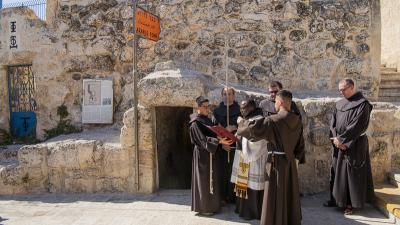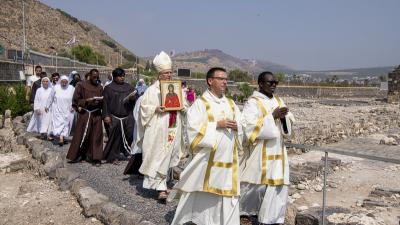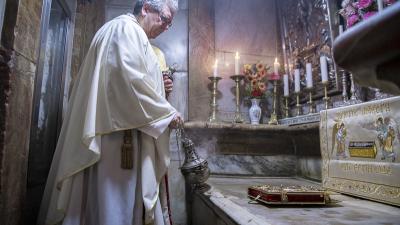
A celebration to remember the presence, preaching and miracles of Jesus was held in the place where those events occurred. With this intention, the friars of the Custody of the Holy Land and pilgrims gathered in Capernaum on October 8. In the church built over what is known to be the house of St. Peter, the Father Custos, Fr. Francesco Patton, celebrated mass.
The liturgy began outside with the proclamation of the Gospel in order to remember the gestures made by Jesus. Capernaum is, in fact, linked to the preaching of conversion, the call of Peter's brothers—Andrew, James and John—to follow the Lord; and it is also connected to the miracles of the healing of Peter's mother-in-law, the woman with the hemorrhage and other people who were ill.
The assembly then gathered for a procession with the cross at the head, followed by friars, the faithful, the priests and the Custos. A choir composed of children and adults from the local area, sang Arabic songs and psalms.
Fr. Francesco Patton homily spoke about Capernaum as the place where Jesus focused much of his efforts to call sinners to salvation and as the the house of mercy. “This is where mercy is manifested as human compassion, when Jesus cures the woman who suffered from bleeding and brings back to life Jairus' daughter,” said the Custos. “What do we do in the house of mercy? We must allow Jesus to welcome us and we must welcome him,” continued Fr. Patton. “Sometimes we can feel paralyzed in front of him, unable to go on at times, but what we must remember is that only he can give us the resurrection and the life. Here in Capernaum we are invited to discover that we need Jesus' mercy in a personal way; each of us and everybody needs it. We must find out what the diseases of our bodies, minds and spirits are for us to put them in Jesus' hands,” concluded the Custos.
At the moment of the offertory, a group of youngsters, led by the master of ceremonies, brought baskets of fruit to the altar. The baskets were then blessed at the end of the mass, as the sign of thanksgiving to God for the goods received during the year's last harvest. The fruit was then distributed after the blessing.
Beatrice Guarrera




